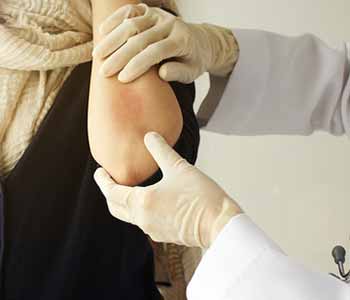Algonquin eczema specialist discusses the types of eczema rash and how to effectively manage the condition
Posted by Dr. Vikram Khanna
What is eczema?
Eczema affects about 10 to 20 percent of infants, yet only about 3 percent of adults in the United States. Patients who suffer from eczema often complain of extremely dry and itchy skin that can be painful and embarrassing. Scratching dry areas of skin to relieve the itch can lead to infection, which is another common side effect of Eczema.Eczema can occur on many different areas of the body, the most common are the face, hands, wrists, back of the knees, and feet. Patches of eczema will look dry, thickened, or scaly. Patients with lighter skin will notice the areas of skin appear red, and then turn brown. Patients with darker skin may notice that eczema affects their skin’s pigmentation, making it look darker or lighter.
While the exact cause of eczema is unknown, it is believed to be an immune system response to an irritant. Most patients with eczema experience flare-ups that are caused by exposure to certain substances. The most common eczema triggers are:
- Pet dander
- Chemicals in certain detergents or soaps
- Rough materials that scratch the skin
- Dust
- Pollen
- Changes in temperature
- Infections or colds
- Stress
Diagnosing and treating eczema
 Eczema is diagnosed by a physical exam along with a series of questions. Patients who experience eczema often have allergies as well. Allergy tests may be used to determine the triggers of eczema.
Eczema is diagnosed by a physical exam along with a series of questions. Patients who experience eczema often have allergies as well. Allergy tests may be used to determine the triggers of eczema. Some of the most common types of eczema rashes are:
Because there is no cure for eczema, the goal for treatment is to reduce flare-ups and minimize the discomfort of symptoms. The following may be recommended to treat eczema:
- Topical creams or lotions to make sure the skin is hydrated and retains moisture.
- Hydrocortisone or corticosteroids to minimize inflammation.
- Antibiotics may be used if there as infection.
- Antihistamines can lessen itching and help with allergies.
- Light therapy may be used to reduce itch and inflammation
In addition to the above-mentioned treatments, avoiding triggers is an important part of managing eczema. Patients are advised to take the following steps to minimize outbreaks:
- Do Moisturize often. Putting lotions or creams on after a shower while the skin is still wet can help retain moisturize.
- Do limit sudden changes in temperature.
- Do not wear rough materials such as wool and synthetic fabrics.
- Do Use gentle soaps, detergents, and household cleaners.
- Do wash your hands after petting any animals. Make sure to dust and vacuum frequently.
- Do take steps to reduce daily stress. Going for a walk, reading, meditating, and yoga can all help.
- Do avoid foods that trigger outbreaks.
- Do consider switching to cotton bedding and clothing which allows the skin to breathe and keeps it cool.






















